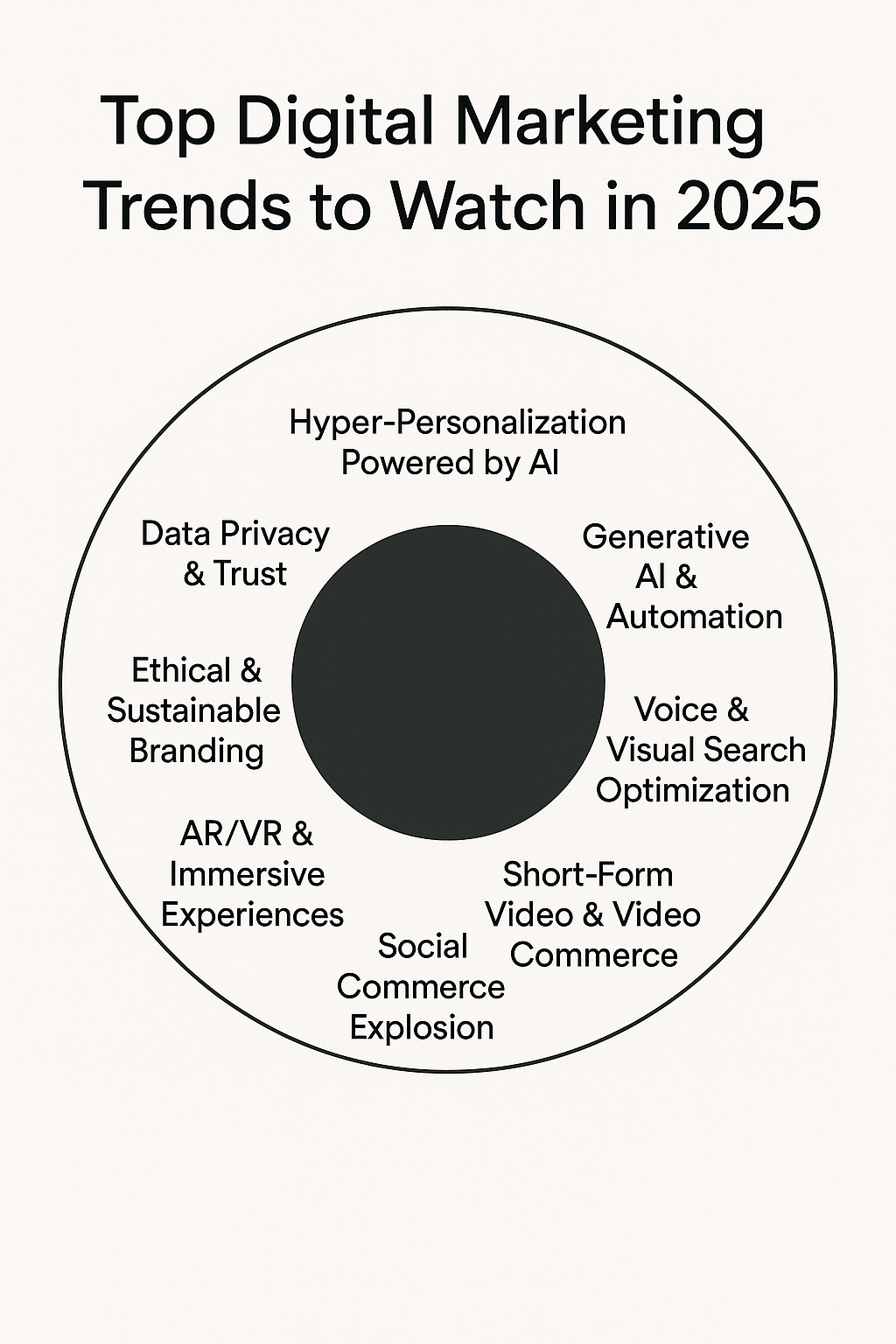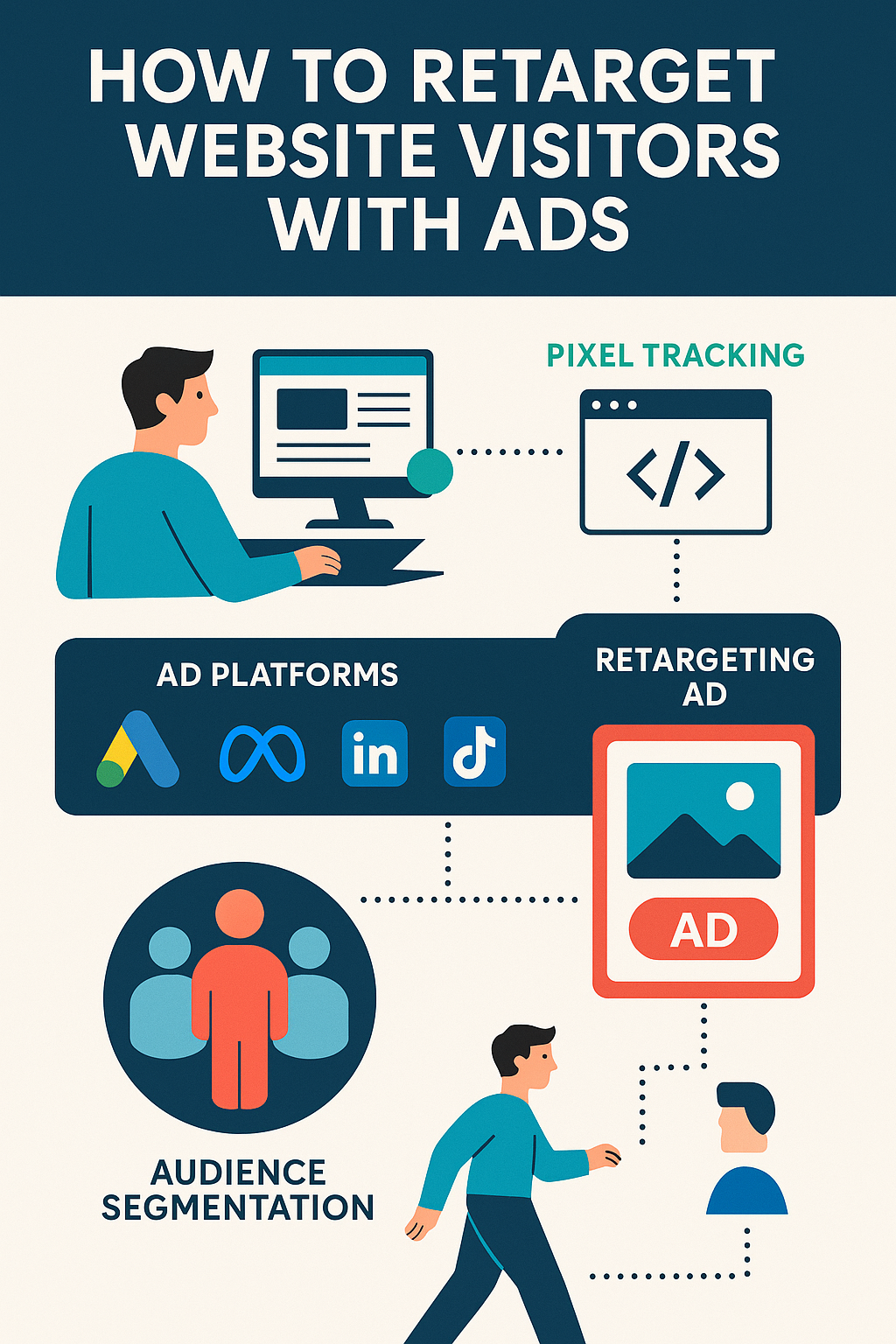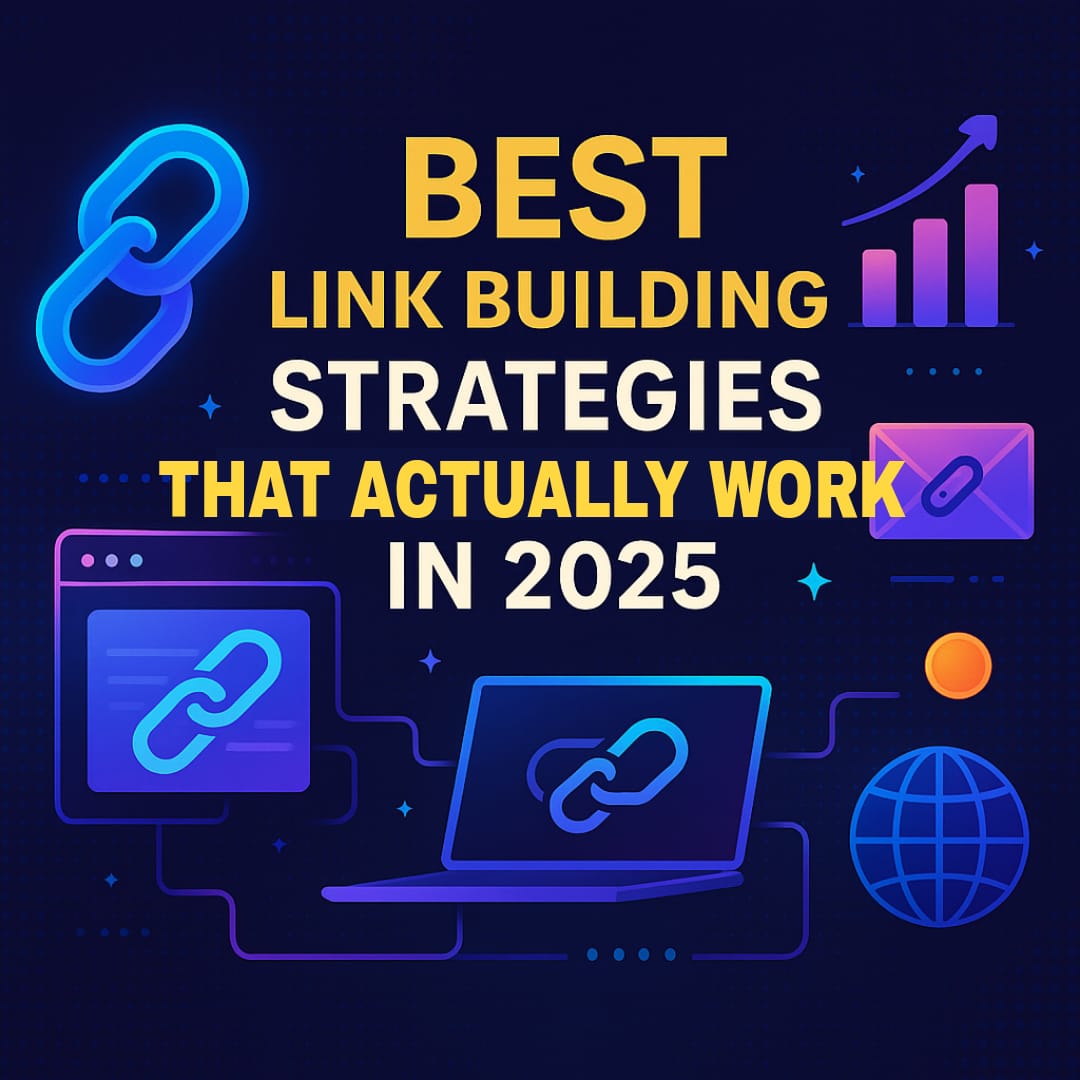Table of Contents
Introduction: The Added Value of Digital Marketing
Digital marketing has never been static. From when blogs were filled with keywords and gimmicky videos, to the sophisticated, people-centered and data-driven digital marketing we find ourselves experiencing today – whatever the context, digital marketers have to embrace change. In 2025, businesses face the most competitive online environment we have seen. The expectations of the consumer is higher than ever, technology is smarter, and the consumer’s need for authentic brand experiences is now an imperative.
For businesses the challenge is clear: react or disappear. The great news? With change comes opportunities. This articles considers the trends of this evolution and the most important digital marketing trends in 2025 and how to leverage one to maintain your position. Top Digital Marketing Trends to Watch in 2025
Top Digital Marketing Trends to Watch in 2025
AI-Driven Marketing: Personalization at Scale
Artificial Intelligence (AI) has become more than a buzzword; it is the bedrock of marketing in 2025. AI tools are redefining how businesses dissect customer data, predict buying behavior, and deliver more personalized experiences.
Hyper-personalization: “Our email campaigns use to stop at ‘Hi, [Name]’. Now AI predicts the product. x our customers are most likely to buy and when.
Intelligent ad targeting: Platforms like Google and Meta are now increasingly employing sophisticated AI and machine learning capabilities in both paid search and advertising to ensure that ads reach micro-segments of audiences and not just traditional market segmentation, therefore limiting wasted spending.
AI-enabled customer support: AI chatbots using natural language processing (NLP) can assist with relatively complex queries, if you factor in wait time. Customers get quicker assistance which can increase satisfaction and boost metrics as a result.
SEO and AdSense pro-tip: Write about AI using long-tail keywords, like “AI in digital marketing 2025” or “how AI improves customer experience.” Long-tail keywords have a wide variety of users that may open up search traffic, as well as satisfy Google’s increasing content depth requirements.
Voice Search and Conversational Marketing
With the increased popularity of voice-enabled devices like Alexa, Siri, and Google Assistant, optimizing for voice search is now baked into SEO. By 2025, nearly half of all searches will be voice-based.
This means:
People are conducting searches according to conversational language rather than keyword phrases typed in. E.g. instead of typing “best pizza NYC” they’re asking, “where can I get the best pizza near me right now?”
This means brands must optimize for question-based queries and conversational keywords.
Brands will also benefit from having FAQ sections, structured data (schema markup), and conversational blog posts that rank better.
Conversational marketing is on fire as well. Brands are leveraging AI chatbots and messaging apps for more than just customer support — they’re increasingly used as full sales funnels. Customers are looking to have real-time, two-way conversations with brands (and the companies that recognize and adapt to this will win)!
The Rise of Short-Form Video Content
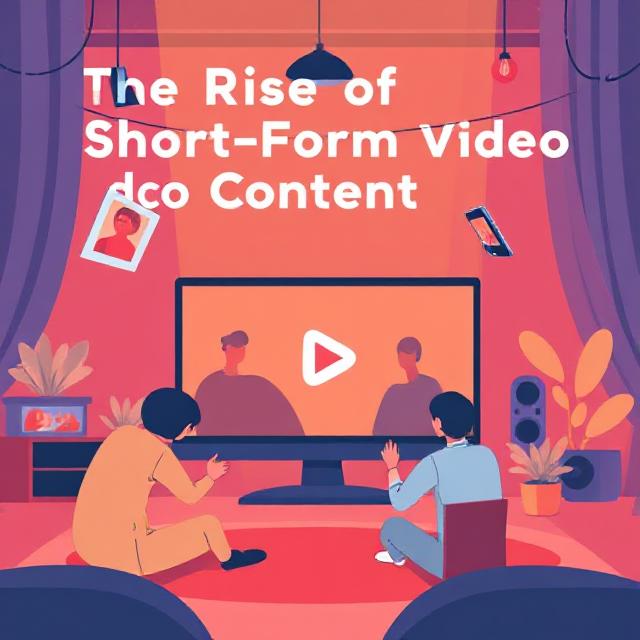
According to Forbes, TikTok, Instagram Reels and YouTube Shorts have become the front-runners in the digital marketing space. TikTok, known for its viral dance videos and challenges, has expanded into a hub for all types of creative content, from educational snippets to brand storytelling. Instagram Reels and YouTube Shorts have followed suit, providing platforms for users and brands alike to express themselves in brief, captivating videos.
Video has been an effective mode of communication and engagement for digital marketing for years. However, in 2025, short-form video has become the king of content. With platforms like TikTok, Instagram Reels, and YouTube Shorts gaining insane amounts of popularity, audiences are being programmed to consume video content in under 60 seconds.
So, why is short-form video so effective?
It is snackable implementation and easy for others (your audiences) to share! Not to mention, it fits well with the fast-scrolling attention spans of today.
Love from algorithms: Social platforms favor content that can drive engagement quickly, which generally requires shorter clips.
Brand strategy: Companies are using a mixture of educational snippets, behind-the-scenes content, and product previews to draw in audiences to short-form video.
What does this mean for businesses?
It means it can convert long-form blogs into short, sweet and snackable video explainers. This is helpful for engaging, audiences, as well as for SEO ranking purposes.
Privacy, Data Protection, and Ethical Marketing
In 2025, consumers have started to think twice about how their data is collected and used. There are stricter privacy regulations (like GDPR, CCPA, and other equivalent laws throughout the world), plus ethical marketing isn’t an option but now mandatory.
Here are the trends:
Cookieless future: More marketers are using first-party data (data collected directly from customers) instead of third party cookies.
Transparent policies: Brands communicate openly about data collection and how customer data is handled to earn trust.
Ethical targeting: Businesses are making conscious efforts to create value instead of annoy customers with intrusive advertising and marketing techniques.
Google is rewarding trustworthy and transparent content, and a solid good privacy already improves your SEO rankings and allows for better AdSense viability if you have clear opt-ins and secure site practices.
Influencer Marketing 2.0: From Celebrities to Communities
Influencer marketing is reaching a level of maturity. Instead of spending millions on a celebrity, brands in 2025 are looking more at micro-influencers and nano-influencers: creators with a smaller community, but often with highly engaged audiences.
Authenticity > reach: A recommendation from a trusted niche creator will often convert better than an expensive advertisement from a mega-celebrity.
Content co-creation: Brands and influencers now work together with influencers to create authentic campaigns, vs paid promotion.
Community power: Building niche online communities (Discord, Telegram, or private groups) is a rising trend.
The change means influencers and brands alike are now able to access influencer marketing at all levels – and it won’t burn through your budget!
Search Engine Optimization in 2025
EO is moving at lightning speed. Google wants you to focus on user intent, content quality, and experience signals. Here are some trends to manage:
E-E-A-T, that’s expertise, experience, authoritativeness, and trustworthiness – great E-E-A-T is the hallmark of high-ranking content.
Core Web Vitals – speed of site, mobile responsiveness, and navigation are still ranking signals,
Multimodal search – Google is not just text any longer, it is combining text, images, and video for a singular search result.
Zero-click searches – Featured snippets and knowledge panels are now driving searches and users are receiving an answer to their queries on Google, you need to focus on using FAQ schema to format your content.
Smart SEO in 2025 means generating deep, useful multimedia-rich content, ensuring user intent is satisfied and increasing time on site!
Social Commerce and the Future of Shopping

The line between social media and e-commerce is gone. Social platforms like Instagram, TikTok, and Pinterest allow users to shop in-app.
Customers can discover, research, and purchase products without leaving the platform.
Live shopping is growing particularly in the fashion, beauty, and tech industries.
They’ve easily integrated payment systems to reduce friction in the buyer’s journey.
For businesses, this means marketing engaging content with sales funnels in the same place. SEO here is extending beyond just optimizing for products to includes product descriptions, hashtags, and metadata for shoppable videos.
Sustainability and Purpose-Driven Branding
Today’s consumers value what your brand champions. In 2025, sustainability, inclusion, and social responsibility are not simply buzzwords – they are people drivers of purchase.
Eco-friendly marketing: brands that promote sustainable practices are successful in attracting eco-conscious audiences.
Inclusive marketing: marketing campaigns that are diverse and represent all people resonate more.
Cause marketing: businesses collaborating with not-for-profit organizations and engaging with community initiatives build relationships in a deeper manner.
This is also a good thing for your SEO, searches like ‘eco-friendly digital products’ or ‘sustainable marketing brands 2025’ are on the rise rapidly.
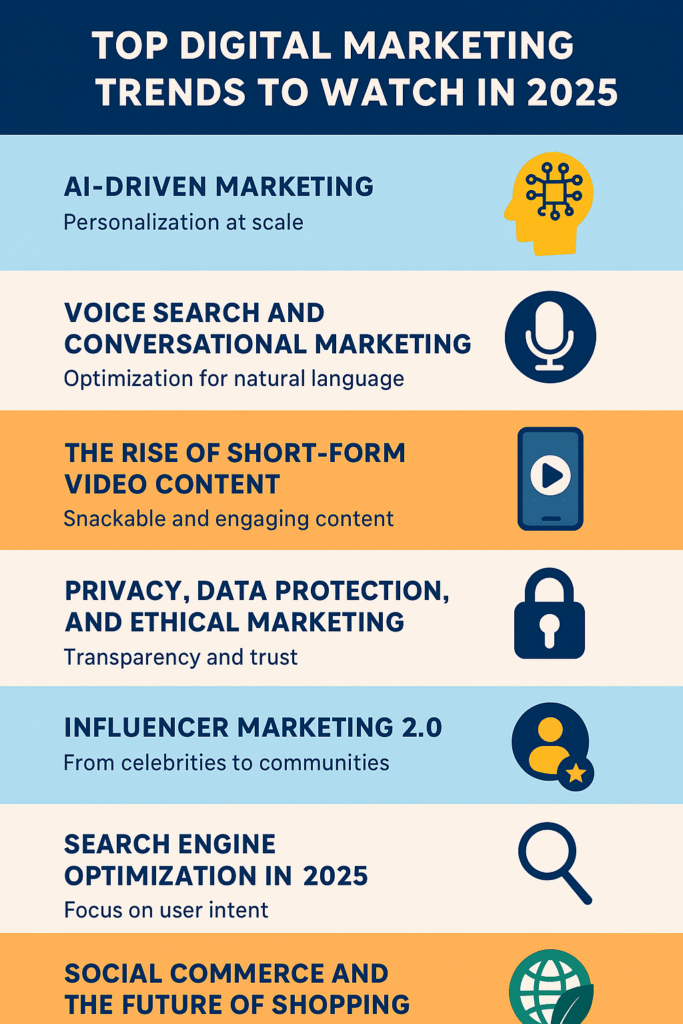
Conclusion: Preparing Your Business for 2025 and Beyond
The digital marketing ecosystem is evolving faster, becoming more competitive, and becoming more exciting by the day in 2025. AI provides a new world of personalization, video is shortening attention spans, privacy affects targeting, and values are driving consumers’ decisions.
Brands need to deliver on data-driven strategies and authentic storytelling. In today’s digital marketplace, the businesses that adapt, are flexible, and concentrate on customer experience, will succeed – and those that do not, may not survive the digital conversation at all.
For more such articles click here.
FAQs on Digital Marketing Trends 2025
What are the important digital marketing trends in 2025?
There are several digital marketing trends. The main trends include the following: artificial intelligence (AI) driven personalization, optimizing for voice search, short-form video content is king, micro-influencer marketing, and privacy-first strategies.
How is AI transforming digital marketing?
AI is enabling businesses and organizations to better understand their customers by analyzing customer behavior and predicting trends and personalized content. AI is also utilized in chatbots, ad targeting, and automation.
Why is voice search important for SEO?
Voice search is increasing rapidly. Therefore, optimizing natural and conversational keywords, as well as question-based keywords, is a way to make your pages more likely to appear in voice search results.
Does using short-form video help with marketing?
Yes. Short-form videos are something that TikTok, Instagram Reels, and YouTube Shorts prioritize. Therefore, short-form videos can enhance engagement, reach the younger generation, and help to expand the brand.
How do privacy laws impact digital marketing?
Privacy laws are leading businesses to rely solely on first-party data, be responsible in getting consent, and to build trust by being transparent about what data is collected and how it will be used.
Is influencer marketing still effective in 2025?
Definitely. But the shift is toward micro and nano influencers which have a smaller, but much more loyal and engaged audience. Authenticity trumps celebrity reach.
How can small businesses compete with big brands on digital marketing?
By marketing to niche markets, practicing local SEO, creating authentic content and building trust in their community, small businesses can compete even against the largest of brands.
What role does sustainability play in marketing?
Consumers are actively looking for brands they can trust and that exhibit environmentally friendly and socially responsible practices. Businesses that can highlight sustainability in their marketing efforts can build trust and use that trust to their advantage to develop repeat customers.
What is social commerce, and why does it matter?
Social commerce is simply selling directly on social platforms like Instagram and Tiktok. It matters because it removes the friction. Consumers can discover products and buy within the app.
How can businesses future-proof their digital marketing plan?
In 2025 and beyond, businesses can future-proof their digital marketing by leveraging AI, investing in SEO, creating quality content, testing new platforms and engaging in constant planning and flexibility to adjust to market changes.
